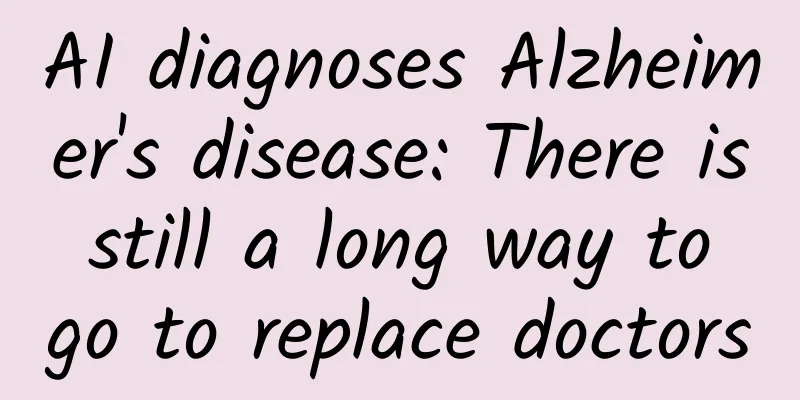AI diagnoses Alzheimer's disease: There is still a long way to go to replace doctors

|
Author: Huang Yanhong Duan Yuechu With the rapid development of medical technology, the application prospects of artificial intelligence (AI) in the medical field have always attracted much attention, especially in the diagnosis of diseases. People have high hopes for it, and some even predict that AI will soon replace human doctors. However, a recent study published in the British Medical Journal is like a wake-up call, making us re-examine this optimistic expectation. This study focuses on exploring the performance of artificial intelligence large language models in detecting early symptoms of Alzheimer's disease. This is not a simple study, which involves multiple well-known artificial intelligence large language models, which have shown amazing capabilities in many previous application scenarios, from answering complex academic questions to generating fluent text content, which makes people look forward to their performance in the field of medical diagnosis. In this test for detecting early symptoms of Alzheimer's disease, the results were surprising. Most of the large language models involved in the test showed signs equivalent to mild cognitive impairment in humans. This means that when faced with the complex and subtle task of detecting early symptoms of Alzheimer's disease, these seemingly powerful AI models are in trouble. They may have problems such as information confusion and inaccurate judgment, just like the confusion and mistakes that a patient with mild cognitive impairment would show when facing the same task. This research result is of great significance. From a medical professional perspective, it reminds us that although AI has advantages in data processing and pattern recognition, its diagnostic capabilities are far from mature and reliable when faced with complex neurological diseases such as Alzheimer's disease. The early symptoms of Alzheimer's disease are often hidden and complex, involving subtle changes in cognition, memory, language and other aspects. Human doctors, with years of professional learning and clinical experience, can unravel the subtle manifestations, medical history and various complex information of patients and make relatively accurate diagnostic judgments. However, it is difficult for AI models to replicate this comprehensive and flexible diagnostic thinking. From a social perspective, this discovery also calms down those who blindly believe that AI will quickly take over the medical industry. Medical care is not just a pile of technology, but also a fusion of humanistic care and professional experience. When facing a disease, patients need more than just a cold diagnosis result, but also the comfort, explanation and personalized treatment plan formulated according to individual conditions. Human doctors can communicate with patients emotionally and understand their fears and concerns, which is beyond the reach of current AI. Experts have also expressed their opinions on this research result. An authoritative expert with profound attainments in the field of Alzheimer's disease research pointed out: "This study has sounded the alarm for us, making us realize that there is still a long way to go in the application of AI in the medical field. We cannot be confused by the previous success of AI in some simple tasks and ignore its limitations in the diagnosis of complex diseases." An expert who focuses on the ethics of medical technology also said: "This discovery also makes us think about how to better play the role of human doctors while developing AI medical technology, so as to achieve complementary advantages between the two, rather than simply replacing human doctors." In my opinion, this study is undoubtedly an important reminder. AI is undoubtedly an important boost to the future development of medical care, but we must look at its development with a rational attitude. We cannot ignore the essence of medicine - care for human life and health - because of the pursuit of technological progress. On the road of exploring AI diagnosis of diseases, we need to conduct more in-depth research on how to improve its accuracy and reliability, and at the same time focus on cultivating the professional qualities of human doctors so that both can serve the health of patients together. Only in this way can we find a balance between science and technology and humanities, and promote the development of medical care in a healthier and more sustainable direction, rather than falling into unrealistic fantasies about AI. |
>>: "Pigeon chest" and "funnel chest": the mystery of chest deformity and the solution
Recommend
There are several shapes of women's vulva
Everyone's body structure is roughly the same...
Pregnant woman's belly button hurts
Some pregnant women feel a pulling pain in their ...
Follow Liu Genghong, have you really lost weight? Doctors recommend: These 7 "eating" methods for medical nutrition weight loss are reliable and effective
If you don't lose weight in March, you will r...
Fishing bait smells sour. Can I use milk flavor to fish? What fish can I catch with chicken feed pellets?
Chicken and duck feed can be used to make nests o...
The top ten body secrets that gynecologists value most
1. The texture of the skin there is different from...
Why does vaginal swelling and pain occur?
Many people will suffer from genital pain due to ...
Slight bleeding after sex
Men and women must be careful when having sex. It...
How to determine amenorrhea
Most women think that amenorrhea means menopause....
How many varieties of guava are there? Why is guava a bit astringent?
Guava is sweet and juicy, with smooth flesh and a...
What is wax gourd? What is the growth period of wax gourd?
Wax gourd has the benefits of clearing heat, reli...
A man was rejected on a blind date because of a change in his palm! Do you have any of these symptoms?
"Slow down on your blind date, you should go...
What to do if the vulva is itchy and has a burning sensation
There are many issues that need to be paid attent...
Women can quickly enhance their physical fitness by using this method!
How can women improve their physique? Everyone kn...
Headache during confinement
A woman's body will be very fragile after giv...
Rereading "Dream of Red Mansions", what exactly is the "tuberculosis" that Lin Daiyu suffered from?
Author: Yang Jie Emergency Department, Shunyi Dis...









